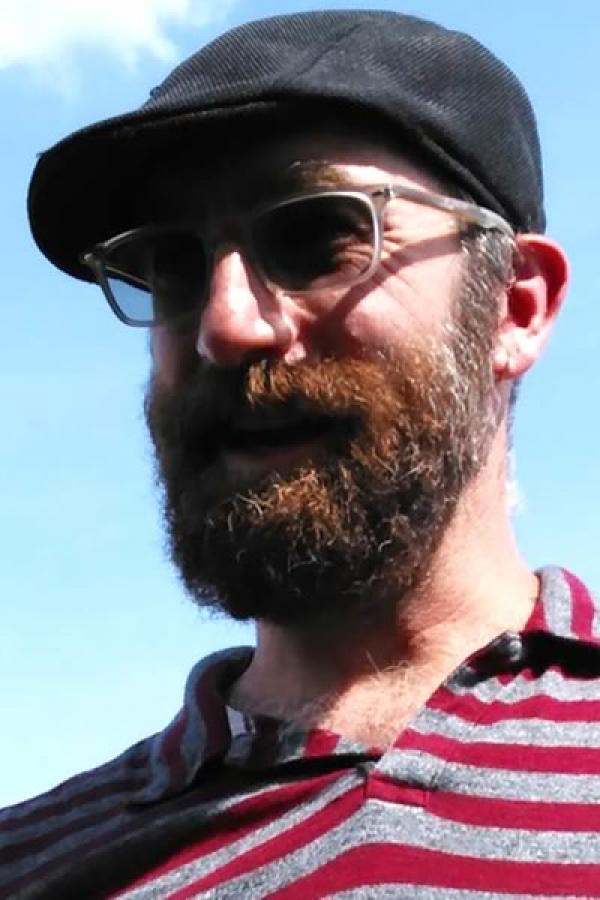Seth Michelson

Photo by Vicki Conti
Bio
Seth Michelson teaches the poetry of the Americas in the Romance Languages Department of Washington and Lee University. An award-winning poet, translator, and professor, his most recent collections of original poetry are Swimming Through Fire (2017) and Eyes Like Broken Windows (2012). His most recent books of poetry in translation include Scripted in the Streams (2017) by the Indian poet Rati Saxena and Poems from the Disaster (2016) by the Argentine poet Zulema Moret. In early 2018 he will see published his translations of the books of poetry The Red Song by the Uruguayan poet Melisa Machado; Wings by the Israeli poet Amir Or; and The Ghetto of My Tongue by the Argentine poet Tamara Kamenszain.
This award is crucial to me at this point in my career, when I am undertaking my most ambitious translation project to date. More specifically, this award will make possible the publication of the first-ever single-author book of poetry by a female Mapuche poet from Argentina in English-language translation. Moreover, that book will be published in a fully trilingual edition, meaning in Mapuzungun, Spanish, and English. This is especially important to both the poet, Liliana Ancalao (b.1961), and me as she is not only a celebrated poet, but also an acclaimed oral historian of Mapuche people and a powerful advocate of indigenous languages, including Mapuzungun. That language shines in her work in all of its rich historicity, extending a cultural genealogy in the Southern Cone dating back some 17,000 years. Through the generosity of an NEA Fellowship, for which I am deeply grateful, I will be able to complete my translations of her poetry and compile our book, thereby sharing her important voice with ever broader audiences across the hemispheric Americas and world.
from The Silenced Language by Liliana Ancalao
[translated from the Spanish]
Although it was only one hundred years ago, it seems to my generation like some mythical age. The Mapuche could roam freely across their territory and communicated with the elements of the mapu. Mapuzungun means “language of the land.” The land speaks. All its beings have language, and the Mapuche know it.
Mapuzungun was the first language, and it was taught and learned in optimal conditions. In the shade of elders, new saplings grew, a perfect green preceding the rituals, near the water.
The women would sing their tavüles, which transmitted power, and the pride of being who one is was not a philosophical question.
But the death that has crept towards the First Peoples of the Americas since 1492 left no stone unturned in the south. The war for the desert, the winka raids, signaled military defeat and the occupation of territory by the Argentine state. “The end of the world” took place one hundred years ago.
Mapuzungun became the language for expressing pain, the language of despondence during the divvying up of men, women, and children as slaves. The clandestine whisper in the concentration camps. The language of solace among prisoners of war. The language for thought.
It was the language of the long road of exile, the distance of banishment. Of the harsh march of our great-grandparents to reservations, ka mapu.
Our grandparents were sent to rural schools and made bilingual by force. But however banned by the schools, where teachers shamed children for their home language, Mapunzungun endured. The language of the land was in the air of orality; Spanish in the writing crossed-out in workbooks
Linguistic anthropologists, ka mollfunche, tried to write it. They created dictionaries and grammar. Just as they tried to trap the territory within barbed-wire fences, so, too, did they try to trap the sound of Mapunzungun within western graphemes.
Within our community, the politics of shame wreaked havoc. Mapuzungun became a stigma, the mark of inferiority of those admitted by force to the capitalist system as cheap labor.
Perhaps the elders made a decision to stop teaching it. Could they get together? Did they speak in Mapuzungun of the future? Maybe they simply went silent, determining their knowledge to no longer suffice, that the saplings could manage better without them in this new world of constant threats, stigmas, accusations, smirks.
Mapuzungun was the language of conversation of the elders, the language for summoning the elements in the intimacy of dawn. The language of defense. Of silence. The city offered work and study to the saplings. Our parents arrived monolingual, without ngillatun, without Mapuzungun, exchanging the natural cycle of time for work hours and school calendars.
And we entered local schools, bearing our faces and surnames, without any language for which to feel ashamed, with Spanish as our one and only tongue, without history or memory.
I’m talking about Puel Mapu and the history of my family, which is the history of so many families, and which explains the loss of our language as mother tongue by the majority of my generation. I’m talking about an ancient language and the ignorance of men who mapped a country over a territory full of names, elements, and meanings, silencing it. I’m talking about what we lost. All of us.
About Liliana Ancalao
A member of the Mapuche-Tehuelche Nankulaven community, Liliana Ancalao (b. 1961) was born in the Patagonian province of Chubut in southern Argentina, an area where nomadic indigenous Tehuelche peoples lived for thousands of years before the arrival of Europeans in the early sixteenth century. This collection will combine into a single volume ample selections from two of Ancalao's works: Women in the Open Air (2001) and Fabric with Raw Wool (2009), and will be published trilingually, in Mapuzungun, Spanish, and English. It also will comprise the first single-author volume of poetry by a female Mapuche poet from Argentina in English-language translation, and only the second ever such single-author collection by a female Mapuche poet. Ancalao writes within a traditional Mapuche framework, honoring the materiality of the Earth as sacred and the rights of people to live free of discrimination.

